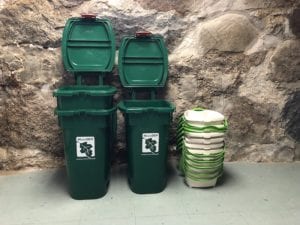Who is a member?
Our members are the local governments of Massachusetts and their elected and appointed leadership.

Hamilton stocks curbside organic waste bins and countertop kitchen bins for its composting program.
Following a years-long period of pilot and opt-in programs, the town of Hamilton passed a mandated food waste composting program in November of last year, the first municipality in the state to do so.
Spearheading the process has been Gretel Clark, chair of the Waste Reduction Committee.
“You just need to provide people with the equipment and say do it!” Clark said.
The ban on food waste and compostable paper in the town’s solid waste stream went into effect on Feb. 1, though a grace period through May 1 gave residents time to acquire or replace missing compost bins free of charge.
“The main reason we are doing this is for environmental reasons,” Clark said. “It is huge to remove food from solid waste. … By taking it out of the waste stream we are putting carbon back into the earth.”
The town’s solid waste is incinerated, while the collected food waste and compostable paper goes to Brick Ends Farm, a composting facility in Hamilton that has been with the program since the beginning, in 2009.
The cost to dispose of the food waste and compostable paper is $40 per ton, less than half the cost of solid waste disposal, according to the Town Manager’s Office.
The level of compost tonnage has fluctuated over the 10-plus years of the program, but Clark expects the mandate to make a difference.
“The heavy stuff in the bin is the wet food material, so we are expecting to see a real change back to much higher tonnage going into the compost,” she said.
The pilot program was launched in 2009 with 74 volunteer households. By 2013, all Hamilton residents were allowed to opt-in to the program. The Massachusetts Department of Environmental Protection provided grant funding to help supply equipment for the town-wide rollout. Every household is provided with a 13-gallon green curbside bin and a 2-gallon kitchen countertop bin.
Starting with a pilot program may not be necessary for communities that are now considering composting programs, Clark said.
“No one was doing it at the time [we started], and we wanted to find some things out about the possibilities,” she said.
The program initially involves a significant amount of community education and outreach, Clark said. The Waste Reduction Committee does a comprehensive annual mailer to remind residents of the program and to introduce any new families that have moved to town. The committee is also available to answer any questions.
The Board of Selectmen had previously instituted an EOW program — or every other week — for solid waste pick up. Clark said this important decision resulted in higher composting rates.
“After we instituted EOW, people found that they could reduce their solid waste buildup by consistently using the compost,” she said. “And then solid waste went down and compost went up.”
At the start of the pandemic, the town returned to a weekly pickup schedule in anticipation of increased waste output.
The town does not impose fines for noncompliance with the food waste program. Beginning with the first week of May, however, trash haulers are instructed not to pick up the black solid waste bins from households that do not have their green compost bin at the curb. Those black bins will receive a rejection sticker notifying the household that their solid waste was not picked up because of the missing compost bin. This does not affect recycling pickup.
Households that already compost on their property can apply for an exemption from the Department of Public Works.
“It does save money,” Clark said. “Not a bundle, but in a small town like this any amount makes a difference. And in this day and age, in the crisis we are in, the townspeople feel like they are making a difference.”